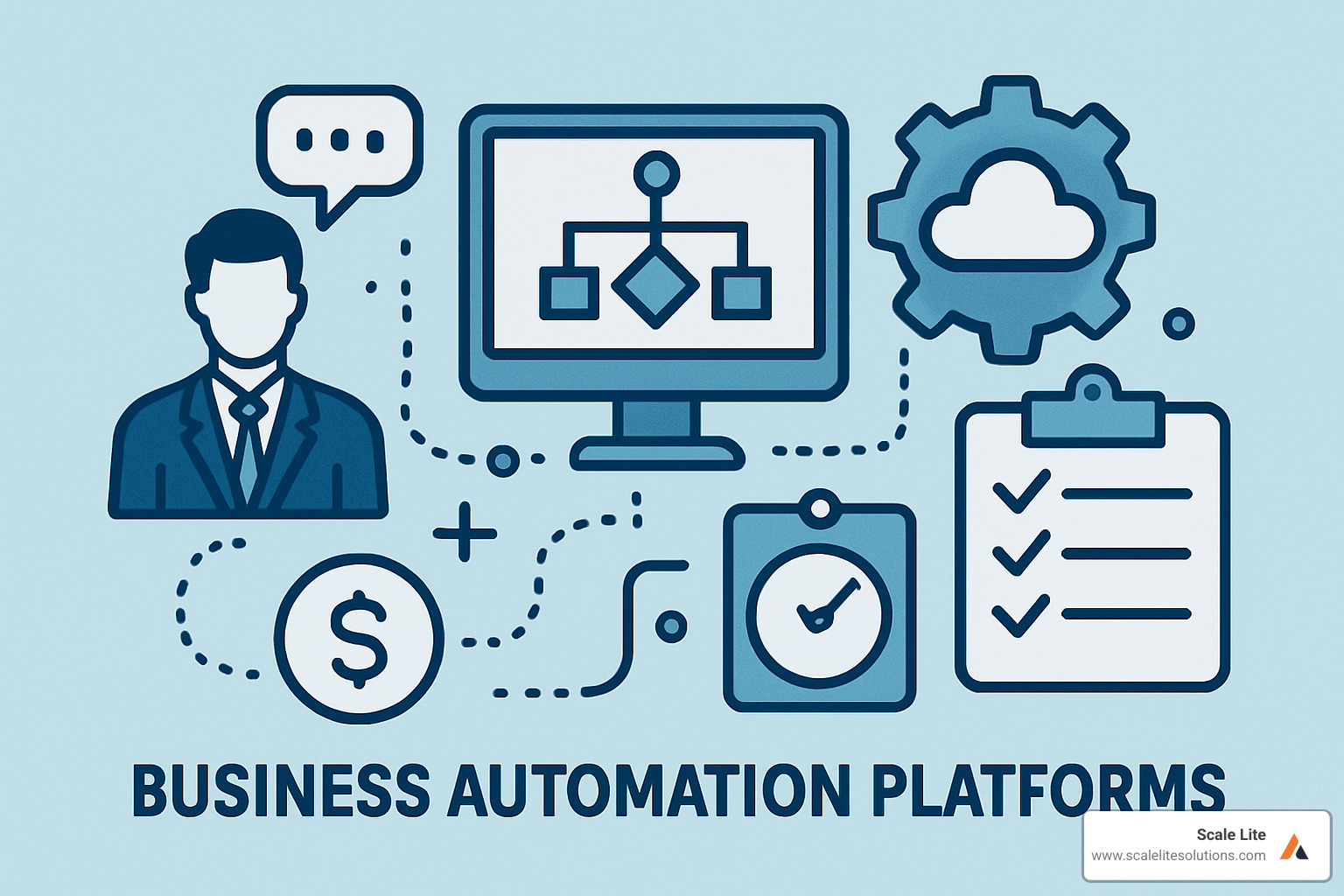
CRM Integration Made Easy – Connecting the Dots for Your Business

Why Your Business Needs a Connected Tech Stack
CRM integration services connect your customer relationship management (CRM) system with other essential tools like marketing platforms, accounting software, and customer service systems. This creates a unified data flow that eliminates manual entry, reduces errors, and provides a complete view of every customer interaction.
Common integrations include:
- Marketing automation to sync leads and campaign data.
- E-commerce platforms to track purchases and customer behavior.
- ERP systems to connect financial data with customer records.
- Customer service desks to unite support tickets with customer history.
- Email and calendars to keep communications organized.
The problem of disconnected systems is costly. Research shows employees switch between apps over 1,100 times per day, wasting significant time on unproductive tasks. When systems don't communicate, you get data silos—customer information scattered across platforms, leading to manual data copying, missed details, and lost opportunities.
CRM integration services solve this by creating a "single source of truth," where all customer data lives and updates automatically. Instead of juggling systems, your team can focus on growing the business and serving customers.
I'm Keaton Kay, and at Scale Lite, I specialize in CRM integration services that help blue-collar business owners reduce manual work and build more efficient, valuable companies.
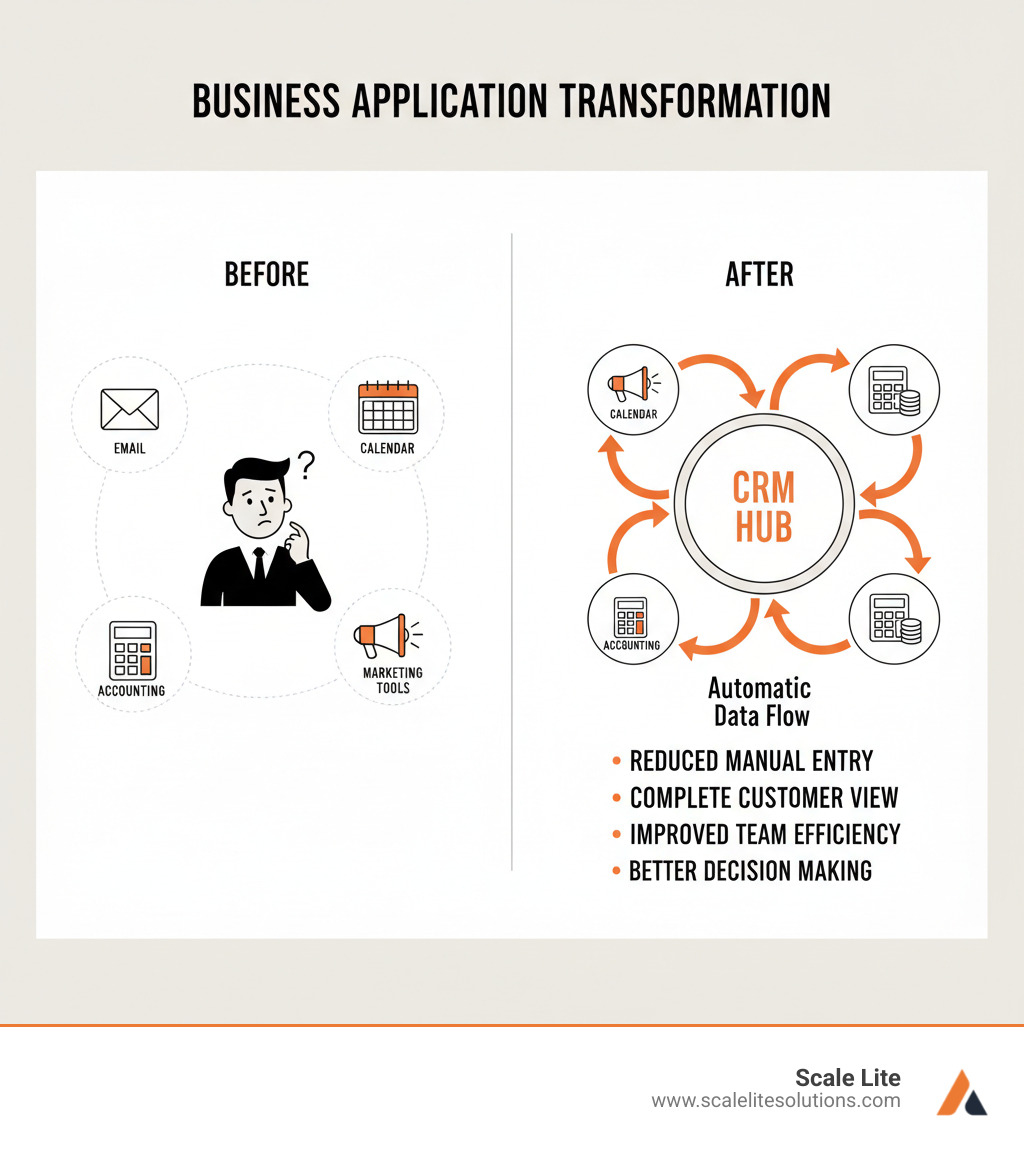
CRM integration services terms to remember:
Why CRM Integration is a Game-Changer for Business Growth
Your business likely runs on hundreds of applications, but research from MuleSoft shows only about 28% of them talk to each other. In fact, 81% of IT leaders say these disconnected data silos are blocking digital change. It's like trying to cook a meal with ingredients scattered across different kitchens—you spend more time running around than cooking.
CRM integration services create bridges between your systems, making your data work for you, not against you.
Improved data accuracy is the first win. When data flows automatically, costly manual entry mistakes disappear, and you no longer have to wonder which system has the correct customer information. This leads to a 360-degree customer view. Imagine a customer calls, and you can instantly see their purchase history, service requests, and marketing interactions. That's the power of integrated systems.
This complete picture transforms your customer experience and boosts team performance. Service agents can solve problems immediately instead of asking repetitive questions, a personal touch that makes all the difference, as we explore in our guide on how to improve customer satisfaction. With fewer app switches, your team spends less time hunting for information and more time helping customers. This boosted productivity is key, and you can learn more in our resource on how to improve employee productivity.
Finally, with all your data in one accurate place, you get the insights needed for better decision-making. You can spot trends and make strategic moves based on real data, which is essential for driving business growth.
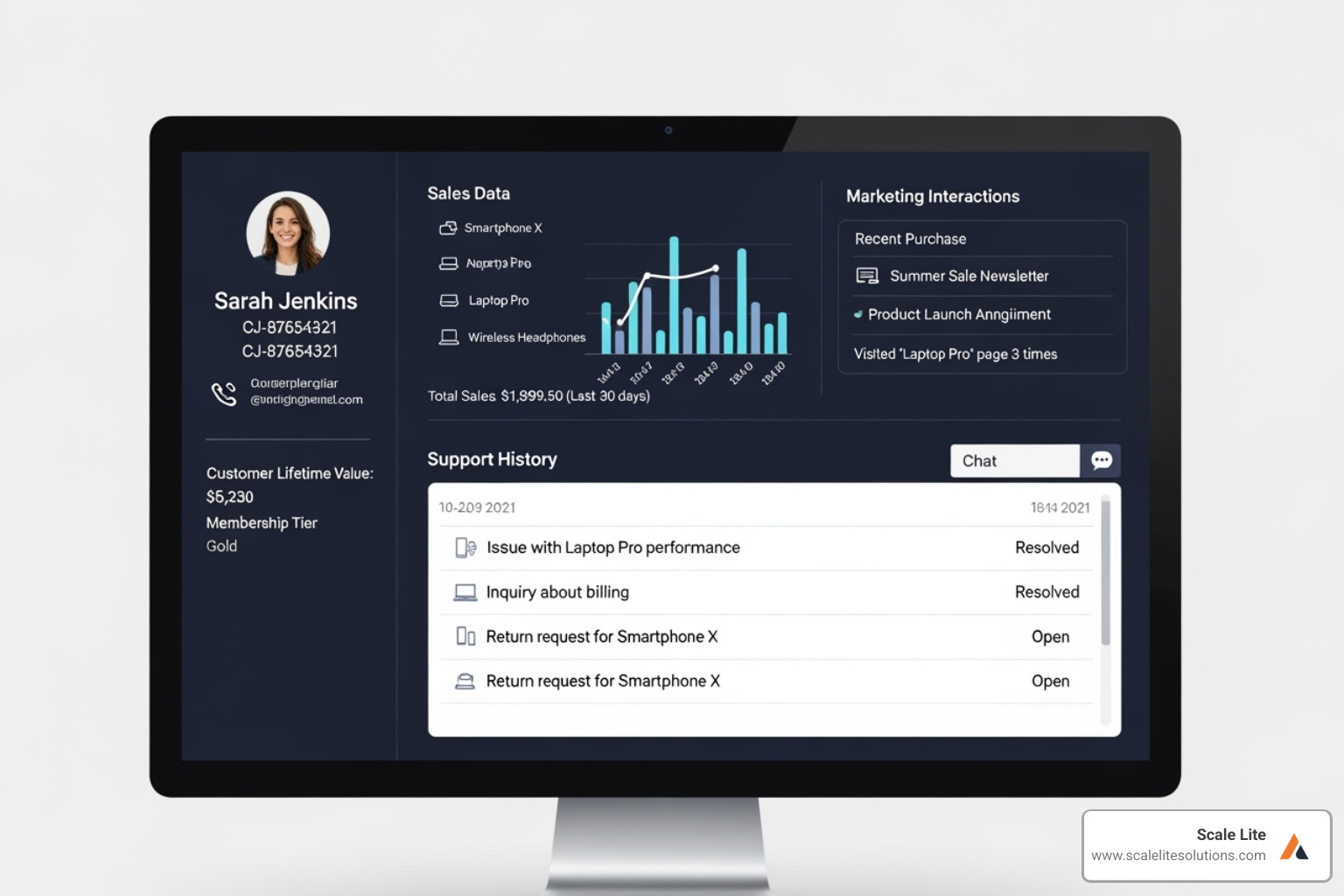
Unifying Your Operations
CRM integration services streamline operational processes by connecting the dots across your business. When the CRM is the central hub, departments stop working in isolation.
Sales and marketing alignment becomes effortless as leads flow automatically from campaigns into your sales pipeline with their full engagement history. The sales team can see what caught a prospect's interest, while marketing gets feedback on lead quality. Your service team efficiency skyrockets when they have a customer's complete story, leading to faster resolutions. This creates a consistent customer journey where every interaction builds on the last, so customers never have to repeat their story.
Enhancing the Customer Experience
In today's market, customer experience is your competitive edge. According to a PwC CEO Survey, 89 percent of CEOs say building customer trust is a top priority. CRM integration services enable the personalization needed to build that trust.
When you know a customer's history and preferences, every interaction becomes personal and relevant. Proactive service becomes possible, as integrated systems can alert you to potential needs, like upcoming maintenance or contract renewals. This approach shows you're paying attention, which builds customer trust and loyalty.
As research by Dimension Data shows, 81 percent of companies see customer experience as a key differentiator. Integration gives you the tools to deliver that differentiated experience consistently, turning satisfied customers into your best marketing channel.
The Core Types of CRM Integration Services
Think of CRM integration services as creating a central hub for your business, with spokes connecting your CRM to all the essential tools that keep your company moving. For a CRM for service businesses, this connected approach is vital for juggling calls, crews, invoicing, and marketing.
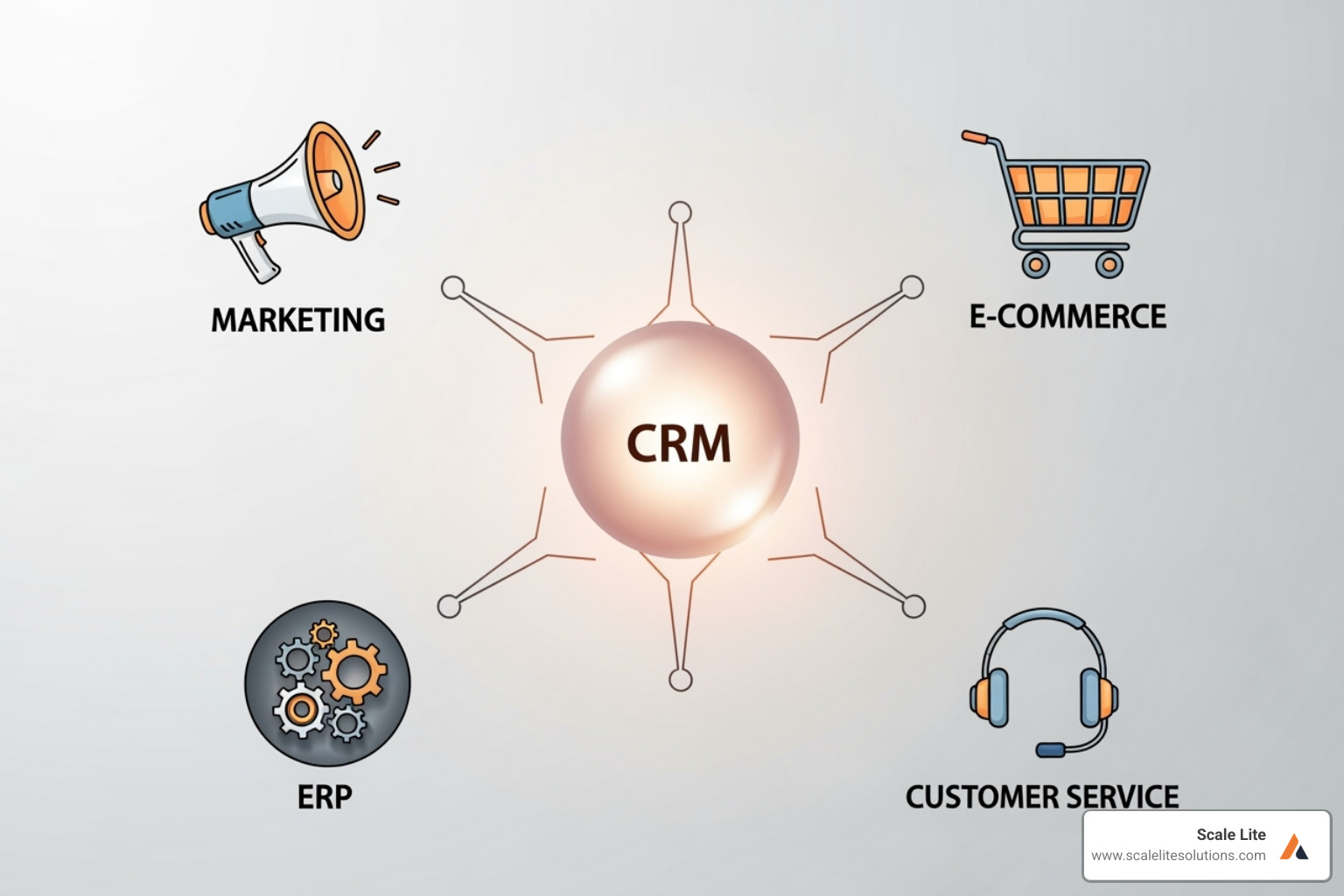
Key CRM Integrations and Their Value
Every business has different needs, so integrations should match your most important operations. Here are the core types and the value they add:
Marketing Automation Integration: Connects your CRM with email and campaign tools. When a lead fills out a form, their info flows directly into your CRM, triggering automated follow-ups. This nurtures leads effectively and shows you which marketing efforts generate paying customers.
E-commerce Platform Integration: Links your online store with your customer database. Every purchase and browsing session is recorded, giving your team the context to make personalized recommendations and troubleshoot issues faster.
ERP System Integration: Bridges customer data with operations like finance and inventory. This allows your sales team to generate accurate quotes based on real-time pricing and stock levels, ensuring profitability and realistic delivery promises.
Customer Service Desk Integration: Ties every support ticket and resolution to the customer's record. Your service team sees the full history, leading to faster problem-solving and happier customers who feel heard.
Email and Calendar Integration: Keeps all communications organized in one place. Every email and appointment appears in the CRM, so any team member can understand the customer's history at a glance.
For businesses needing digital solutions for contractors, these integrations are invaluable for managing job sites, schedules, and customer expectations seamlessly.
Your Blueprint for a Successful Integration
Starting a CRM integration services project requires a clear blueprint. Successful integration isn't just about connecting software; it's about connecting your people, processes, and data. Our approach focuses on three pillars: strategic planning, technical execution, and user adoption. Missing one can turn your project into an expensive, unused experiment.

How APIs Act as the Bridge Between Your Apps
The technical magic behind integration is the API (Application Programming Interface). Think of an API as a universal translator between your apps. It takes a request from one system, translates it for another, and brings back the answer, allowing different software to communicate fluently.
For example, when a customer asks about an order, an API can pull order details from your e-commerce platform, payment status from your accounting software, and shipping updates from your logistics system—all into your CRM instantly. This is achieved through an API-led approach that organizes data flow:
- System APIs pull raw data from core systems (like your ERP or customer database).
- Process APIs combine data from multiple System APIs for a specific purpose (like a complete order status).
- Experience APIs tailor that combined data for a specific user, like the user-facing layer that tailors information for a sales rep versus a service agent.
Overcoming Common Integration Problems
Even with good planning, challenges can arise. Here’s how to handle them:
- Data Mapping Challenges: Different systems use different names for the same thing (\"customer\" vs. \"client\"). We solve this by creating a data dictionary early on.
- System Compatibility Issues: Legacy systems often weren't built to integrate. We can build custom connectors or use middleware to bridge the gap.
- Security Concerns: Protecting data as it moves is critical. We implement robust encryption, secure authentication, and strict access controls.
- User Resistance to Change: People are comfortable with their routines. We counter this by involving users early, communicating benefits, and providing hands-on training.
- Lack of Technical Resources: Most service businesses don't have dedicated IT teams for complex integrations. Our CRM integration services provide this specialized expertise.
- Breaking Down Departmental Silos: Integration forces collaboration. Success requires commitment from leadership and patience as teams learn to work together.
Best Practices for Your CRM Integration Services Strategy
To ensure a successful project, follow these best practices:
- Define Clear Goals: Know what you want to achieve, whether it's faster response times or higher productivity. Specific goals guide decisions.
- Involve Stakeholders Early: Bring together people from sales, marketing, service, and finance from day one to ensure the solution works for everyone.
- Prioritize Data Quality: Clean your data before migrating it. Removing duplicates and standardizing formats ensures your new system provides reliable insights.
- Choose Scalable Solutions: Select platforms that can grow with your business and connect to future applications without a complete rebuild.
- Plan for Thorough Testing: Test data flow, security, and user workflows before going live to find and fix problems early.
- Provide Comprehensive Training: A great system is useless if no one knows how to use it. We provide custom training and ongoing support to ensure user adoption and successful business process streamlining.
The Future is Automated and Intelligent
The real magic of CRM integration services happens when systems start to think, learn, and act on your behalf. At Scale Lite, we help create businesses that run themselves by building this kind of intelligence on a solid integration foundation.
Fueling Automation and Data Accuracy
Properly integrated systems automate routine tasks with a consistency that's impossible to achieve manually. When a lead comes in, it can be automatically assigned and nurtured without human intervention. This automation also reduces human error, ensuring data like addresses and phone numbers are correct across all platforms. With real-time data synchronization, your team always has the latest information, whether in the office or in the field.
The true power emerges when you trigger workflows across systems. For example, when a deal is marked \"closed-won\" in the CRM, it can instantly generate an invoice in your accounting software, update inventory, and send a welcome email. This seamless orchestration is the goal of business automation platforms.
The Role of AI in Modern CRM Integration
Artificial intelligence (AI) is making integrated CRM systems smarter and more intuitive today. Instead of just reacting to customer needs, you can start anticipating them.
AI-powered insights and predictive analytics turn your integrated data into a crystal ball. AI can analyze patterns to identify which leads are most likely to convert, which customers are at risk of leaving, and what your sales forecast realistically looks like. It considers everything from email engagement to support ticket sentiment for surprising accuracy.
This enables true personalization. Your sales team can suggest relevant products, and marketing messages feel individually custom. In customer service, AI can power smart chatbots for routine questions and provide human agents with recommended solutions for complex issues. This is AI-driven workflow automation in action—technology that learns and adapts with every interaction.
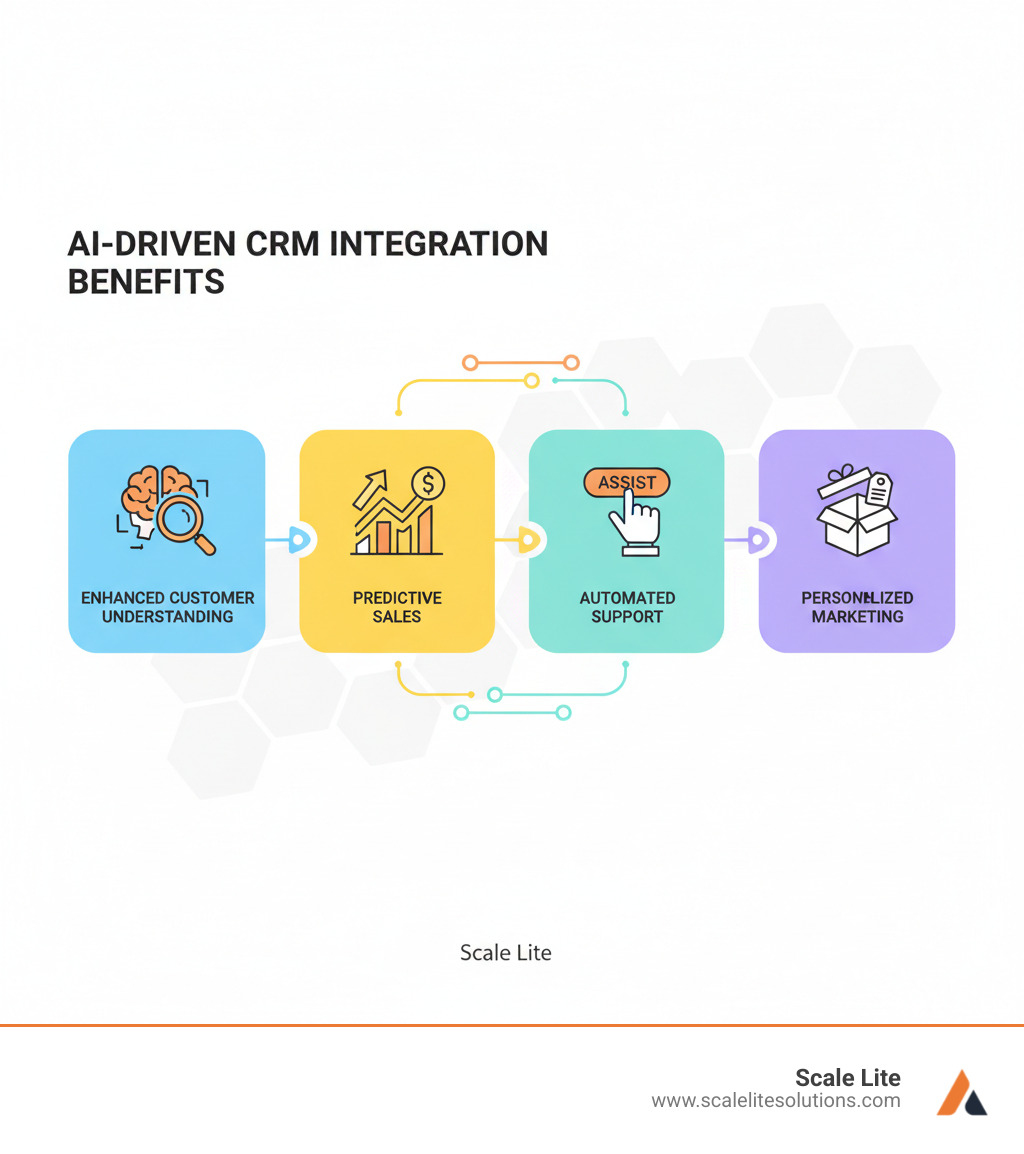
The future isn't just automated—it's intelligently automated. With the right CRM integration services foundation, that future is available to your business today.
Choosing the Right Integration Partner
Finding the right partner for your CRM integration services is critical to your project's success. You need a partner who understands your vision, has the skills to execute it, and provides long-term support.
At Scale Lite, we've seen businesses struggle with partners who don't understand the unique challenges of service industries. Our digital change services are designed for businesses like yours. We translate complex tech into practical solutions and stick around to ensure everything works as your business grows.
What to Look For in a Provider
When evaluating partners for CRM integration services, look for these key qualities:
- Proven Track Record: Seek a provider with success stories in your industry. Experience with a plumbing contractor is different from experience with a software company.
- Understanding of Your Business: A good partner asks detailed questions about your processes, pain points, and goals to tailor the solution.
- Customization Capabilities: Your business is unique. Ensure your partner can handle both standard connectors and custom development to fit your specific workflows.
- Focus on Partnership: Look for a partner invested in your long-term success, not just a one-off project. They should be responsive, transparent, and willing to educate your team.
- Transparent Pricing: A good partner provides clear upfront costs and explains ongoing maintenance or scaling expenses. Avoid hidden fees.
- Ongoing Support and Maintenance: Integration isn't a one-time event. Choose a partner who offers clear support options to help as your systems evolve.
The right integration partner becomes an extension of your team, helping you use technology to build a more valuable, efficient business.
Conclusion
CRM integration services have become essential for modern business operations. Connecting your CRM with other tools transforms scattered data into powerful insights, streamlines workflows, and turns frustrated customers into loyal advocates.
When your systems communicate, your entire business runs smoother. We've explored the core types of integrations, the API technology that makes it possible, and the blueprint for a successful project. The future takes this a step further, using AI and automation to create intelligent systems that learn, predict, and act on your behalf.
At Scale Lite, we specialize in this change for blue-collar service businesses. Our holistic approach to growth focuses on creating seamless systems that boost operational efficiency and drive your bottom line. The businesses that thrive today choose connection over isolation and insights over guesswork.
Your customers and your team deserve better than fragmented systems and wasted time. CRM integration services are the pathway to becoming a more efficient, customer-centric, and sustainable business.
Ready to connect the dots and open up the efficiency hidden in your business?




